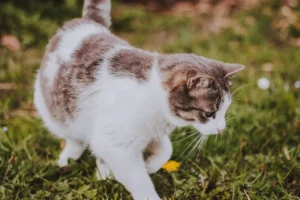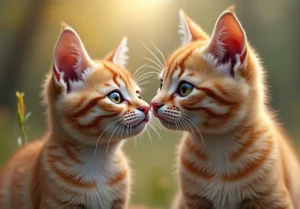Cats are known for their agility, independence, and hunting instincts. It’s not uncommon for our feline friends to bring home a catch, whether it be a bird, mouse, or other small animal. But why do cats kill animals? Let’s explore the reasons behind this behavior.
Cats have a natural instinct to hunt and kill prey, which stems from their ancestry as hunters in the wild. This behavior is not necessarily driven by hunger, as most domestic cats are well-fed and cared for by their owners. Instead, hunting and killing prey is a way for cats to practice their hunting skills, exercise their natural instincts, and satisfy their innate curiosity.
Evolutionary Instincts: Understanding the Hunting Behavior
Cats have a long history of being skilled hunters, a trait that has been passed down through generations. Evolutionary instincts drive their hunting behavior, as wild cats needed to hunt for survival. Even though domestic cats don’t rely on hunting for food, this instinctual behavior remains strong.
The act of hunting is deeply ingrained in a cat’s DNA. Their ancestors had to hunt to survive, and this behavior became a natural and essential part of their existence. Natural selection favored cats with strong hunting abilities, ensuring their species’ survival over time.
When your cat brings you a “gift” of a captured bird or mouse, it’s not trying to be cruel. Instead, it is simply following its biological instincts. To help satisfy this natural urge, providing interactive toys that mimic prey can help fulfill your cat’s hunting instincts in a safe and controlled environment.
Playful Behavior: The Connection Between Hunting and Play
For cats, hunting is not just about catching prey; it’s also a form of entertainment and mental stimulation. Playful behavior in cats often mirrors their hunting instincts, as they stalk, pounce, and chase imaginary prey around the house.
By engaging in playful activities, cats can hone their hunting skills while also having fun. This helps keep them physically and mentally stimulated, preventing boredom and behavioral issues. Providing interactive toys that encourage chasing and catching can satisfy your cat’s natural hunting instincts in a playful manner.
Next time you see your cat playfully pouncing on a toy mouse or stalking a feather wand, remember that it’s not just play—it’s a way for them to satisfy their innate hunting instincts in a domestic setting.
Additional Unique Insight: Cats’ play behavior is essential for their physical and mental well-being, as it helps them stay active, maintain agility, and prevent obesity. By encouraging playtime, you are not only keeping your cat entertained but also promoting their overall health and happiness.
Territorial Behavior: Establishing Dominance Through Hunting
Cats have an innate instinct to hunt, not just for food but also to establish and defend their territory. By hunting and killing prey, cats mark their turf and send a message to other animals that this area belongs to them. It’s their way of asserting dominance and ensuring they have control over their surroundings. So, the next time your cat proudly presents you with a “gift” of a bird or mouse, remember they’re not just showing off their hunting skills but also solidifying their place in the neighborhood.
Environmental Impact: Cats as Invasive Species
When domestic cats are allowed to roam freely outdoors, they can have a significant impact on local wildlife populations. Cats, especially those that are skilled hunters, can decimate bird and small mammal populations in a given area. This can disrupt the natural balance of ecosystems and lead to declines in certain species. To mitigate this impact, consider keeping your cat indoors or supervising their outdoor activities. Additionally, providing your cat with toys and interactive play can help satisfy their hunting instincts without harming local wildlife. Remember, keeping your cat indoors not only protects wildlife but also keeps your furry friend safe from potential dangers outside.
Tips for Responsible Cat Ownership
- Spay or Neuter Your Cat: This can help reduce the number of feral cats and control the overall cat population.
- Use a Breakaway Collar: Ensure your outdoor cat wears a breakaway collar with ID tags to help them find their way back home if they wander too far.
- Provide Mental Stimulation: Engage your cat with interactive toys and play sessions to satisfy their natural hunting instincts.
- Create Outdoor Enclosures: If you want to give your cat outdoor access, consider building a secure outdoor enclosure to keep them safe while still enjoying the outdoors.
- Regular Vet Check-ups: Make sure your cat is up to date on vaccinations and parasite prevention to ensure their health and well-being.
Preventing Hunting Behavior: Tips for Cat Owners
Cats have a natural hunting instinct that can lead them to chase and kill other animals. As a responsible cat owner, there are steps you can take to prevent this behavior and keep wildlife safe. Provide your feline friend with plenty of interactive toys and engage in regular playtime to satisfy their predatory instincts. Creating an enriching environment in your home can help redirect their hunting energy towards appropriate outlets.
Avoid leaving your cat unsupervised outdoors, especially during dawn and dusk when wildlife is most active. Consider installing a catio or cat enclosure to allow your cat to enjoy the outdoors safely. Spaying or neutering your cat can also decrease their desire to roam and hunt.
It’s essential to praise and reward your cat for playing with toys rather than hunting live prey. Additionally, providing puzzle feeders and interactive games can offer mental stimulation and simulate the thrill of the hunt without causing harm to other animals. By incorporating these strategies into your cat’s daily routine, you can help curb their hunting behavior and promote a harmonious relationship with nature.
Alternatives to Hunting: Channeling Natural Instincts
While hunting is a natural behavior for cats, there are alternative ways to satisfy their instincts without putting other animals at risk. Consider setting up bird feeders outside windows to provide entertainment for your cat as they watch birds. This can help fulfill their desire to observe prey without causing harm.
Introducing puzzle feeders that dispense small amounts of food throughout the day can also mimic the challenge of hunting. Interactive toys that engage your cat’s senses and encourage physical activity are excellent alternatives to hunting live animals. Engaging in regular play sessions with your cat using wand toys or laser pointers can help burn off excess energy in a constructive way.
Remember that each cat is unique, so it may take some trial and error to find the best alternatives to hunting that work for your feline companion. By providing stimulating activities and outlets for their predatory instincts, you can help your cat lead a fulfilling and enriched life while respecting the welfare of other animals.
Understanding Your Cat’s Behavior: Signs to Look For
When your furry feline friend starts exhibiting certain behaviors, it’s not just a random whim – they might be in hunting mode. Look out for these key signs: dilated pupils, stalking movements, twitching tail, and intense focus on a specific target. These cues indicate that your cat is ready to pounce, so it’s essential to interpret and respond accordingly.
If you notice your cat displaying these hunting behaviors, try engaging them in interactive play with a toy to redirect their energy. Providing them with puzzle feeders or treat-dispensing toys can also mimic the hunting experience and keep them mentally stimulated. Understanding your cat’s natural instincts and responding appropriately can help satisfy their hunting drive while keeping wildlife safe.
Fun Facts About Cats and Their Hunting Habits
- Did you know that domestic cats are one of the most successful predators on the planet? Their hunting prowess is unmatched, with an estimated 70% success rate when capturing prey.
- Cats have a unique hunting strategy called “stalking and pouncing,” which mimics their wild ancestors. This method allows them to sneak up on their prey and strike with lightning speed.
- Despite popular belief, cats don’t hunt just for fun – it’s an instinctual behavior rooted in their DNA. They are hardwired to capture prey to fulfill their nutritional needs and maintain their hunting skills.
- Cats have specialized hunting adaptations, such as retractable claws, keen eyesight, and excellent hearing, which make them efficient and deadly hunters in the wild.
- Studies show that even well-fed domestic cats still exhibit hunting behaviors, indicating that it’s not solely driven by hunger but by their innate predatory nature.
For more insights on cat behavior and tips on managing their hunting instincts, check out this resource on managing your cat’s natural behaviors: Cat Behavior
Conclusion
In wrapping up our discussion on why cats kill animals, it is crucial to understand that this behavior is deeply rooted in their natural instincts as hunters. As responsible pet owners, it is important to address this behavior in a compassionate manner that respects both the needs of our feline friends and the welfare of other animals. By providing plenty of interactive toys, engaging playtime, and mental stimulation, we can help satisfy their hunting instincts in a safe and healthy way.
Keep in mind that cats killing animals is not an act of maliciousness but rather a way for them to express their natural behaviors. By taking the time to understand and address this behavior, we can create a harmonious coexistence between our beloved pets and the wildlife around us. So, let’s approach this issue with empathy, patience, and a commitment to responsible pet ownership.
Remember, a happy and fulfilled cat is less likely to engage in hunting behaviors, so let’s strive to keep our feline companions content and engaged for a harmonious and peaceful living environment for all.
And always remember, if you have any concerns about your cat’s hunting behavior, don’t hesitate to reach out to a professional veterinarian or animal behaviorist for guidance and support.
Additional Tip: – Providing plenty of vertical spaces in your home, such as cat trees or shelves, can offer your cat a safe and elevated vantage point to observe and satisfy their hunting instincts.
Alex, a passionate animal lover, has experience in training and understanding animal behavior. As a proud pet parent to two dogs and three cats, he founded AnimalReport.net to share insights from animal experts and expand his knowledge of the animal kingdom.




